Is a CT Scan specific to an organ?
What I mean by that question is the following: if you google a bit you will often find list with radiation exposure due to the CT scan, see for example here. In these lists the dose varies depending on what exactly gets scanned. But its not unusual to find lists that are divided by bodyparts, rather than organs (the examples for this would be in German, so I'm not sure if linking them is alright). What I now would like to know is if one scan of a body part can be used to evaluate different organs.
For example, if your urologist sends you to a CT scan of your kidneys can the same CT scan be used to evaluate your gastrointestinal tract, or your colon, etc.? What are the limitations of this and does it make a difference if contrast material was used or not?
Note: I am not interested in answers about the radiation dose due to CT scans!

